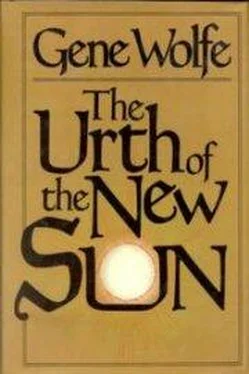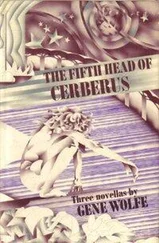“You’ll have to wake me, then,” she said. “All that wine’s made me sleepy.” The voice of Ceryx came through the shutters, lifted in an eerie chant.
“I will,” I told her as she slipped beneath the blankets with me.
Sleep was just closing my eyes when the dead man’s ax burst open the door, and he stalked into the room.
I DID not know it was the dead man at first. The room was dark, the cramped little hall outside nearly as dark. I had been half asleep; I opened my eyes at the first blow of the ax, only to see the dim flash of steel when its edge broke through with the second.
Burgundofara screamed, and I rolled out of bed fumbling for weapons I no longer possessed. At the third blow, the door gave way. For an instant the dead man was silhouetted in the doorway. His ax struck the empty bed. Its frame broke, and the whole affair collapsed with a crash.
It seemed the poor volunteer I had killed so long ago in our necropolis had returned, and I was paralyzed with terror and guilt. Cutting the air, the dead man’s ax mimicked the hiss of Hildegrin’s spade as it swung past my head, then struck the plaster wall with a thud like the kick of a giant’s boot. The faint light from the doorway was extinguished for a moment as Burgundofara fled.
The ax struck the wall again, I think not a cubit from my ear. The dead man’s arm, as cold as a serpent and scented with decay, brushed my own. I grappled with him, moved by instinct, not thought.
Candles appeared, and a lantern. A pair of nearly naked men wrestled the dead man’s ax away, and Burgundofara held her knife to his throat. Hadelin stood beside her with a cutlass in one hand and a candlestick in the other. The innkeeper held his lantern up to the dead man’s face, and dropped it.
“He’s dead,” I said. “Surely you’ve seen such men before. So will you and I be in time.” I kicked the dead man’s legs from under him as Master Gurloes had once taught us, and he fell to the floor beside the extinguished lantern.
Burgundofara gasped, “I stabbed him, Severian. But he didn’t—” Her mouth snapped shut with the effort not to weep. The hand that held her bloodied knife shook.
As I put my arm about her, someone shouted, “Look out!”
Slowly, the dead man was getting to his feet. His eyes, which had been closed while he lay on the floor, opened, though they still held the unfocused stare of a corpse, and one lid drooped. A narrow wound in his side oozed dark blood.
Hadelin stepped forward, his cutlass raised.
“Wait,” I said, and held him back.
The dead man’s hands reached for my throat. I took them in my own, no longer afraid of him or even horrified by him. I felt instead a terrible pity for him and for us all, knowing that we are all dead to some degree, half sleeping as he was wholly asleep, deaf to the singing of life in us and around us.
His arms dropped to his sides. I stroked his ribs with my right hand, and life flowed through it, so that it seemed each finger was to unfold petals and bloom like a flower. My heart was a mighty engine that would run forever and shake the world with every beat. I have never felt so alive as I did then, when I was bringing life to him.
And I saw it — we all saw it. His eyes were no longer dead things, but the human organs by which a man beheld us. The cold blood of death, the bitter stuff that stains the sides of a butcher’s block, stirred again in him and gushed from the wound Burgundofara had made. That closed and healed in an instant, leaving only a crimson stain upon the floor and a white line on his skin. Blood rose in his cheeks until they were no longer sallow but brown and held the look of life.
Before that moment, I would have said a man of middle age had died; the youth who stood blinking before me was no more than twenty. Recalling Miles, I put my arm about his shoulders and told him that we welcomed him once more to the land of the living, speaking softly and slowly as I would have to a dog.
Hadelin and the others who had come to aid us backed away, their faces filled with fear and wonder; and I thought then (as I think now) how strange it was that they should have been so brave when they faced a horror, but such cowards when confronted by the palinode of fate.
Perhaps it is only that when we contend with evil, we are engaged against our brothers. For my own part I understood then something that had puzzled me from childhood — the legend that in the final battle whole armies of demons will fly from the mere sight of a soldier of the Increate.
Captain Hadelin was last out the door. He paused there, mouth agape, seeking the courage to speak or perhaps merely seeking the words, then spun about and bolted, leaving us in darkness.
“There’s a candle here someplace,” Burgundofara muttered. I heard her searching for it.
A moment later I saw her as well, wrapped in a blanket, stooped over the little table that stood beside the ruined bed. The light that had come to the sick man’s hut had come again, and she, seeing her own shadow traced black by it before her, turned and saw it and ran shrieking after the rest.
There seemed little to be gained by running after her. I blocked the doorway as well as I could with chairs and the wreck of the door, and by the light that played wherever I directed my eyes dragged the torn mattress to the floor, so the man who had been dead and I might rest.
I said rest and not sleep, because I do not think either of us slept, though I dozed once or twice, waking to hear him moving about the room on journeys not confined by our four walls. It seemed to me that whenever I shut my eyes they flew open to watch my star burning above the ceiling. The ceiling had become as transparent as tissue, and I could see my star hurling itself toward us, yet infinitely remote; and at last I rose and opened the shutters, and leaned out of the window to look at the sky.
It was a clear night, and chill; each star in heaven seemed a gem. I found I knew where my own star hung, just as the gray salt geese never fail of their landing, though we hear their cry through a league of fog. Or rather, I knew where my star should be; but when I looked, I saw only the endless dark. Rich-strewn stars lay in every other corner of the sky like so many diamonds cast upon a master’s cloak; and perhaps belonged, every star, to some foolish messenger as forlorn and perplexed as I. Yet none were mine. Mine was there (somewhere), I knew, though it could not be seen.
In writing such a chronicle as this, one wishes always to describe process; but some events have no process, taking place at once: they are not — then are. So it was now. Imagine a man who stands before a mirror; a stone strikes it, and it falls to ruin all in an instant.
And the man learns that he is himself, and not the mirrored man he had believed himself to be.
So it was with me. I knew myself the star, a beacon at the frontier of Yesod and Briah, coursing through the night. Then the certainty had vanished, and I was a mere man again, my hands upon a windowsill, a man chilled and soaked with sweat, shaking as I listened to the man who had been dead move about the room.
The town of Os lay in darkness, green Lune just vanishing behind the dark hills beyond black Gyoll. I looked at the spot where Ceryx had stood with his audience, and in the dim light it seemed I could make out some traces of them still. Moved by an impulse I could not have explained, I stepped back into the room and dressed myself, then sprang over the sill and down onto the muddy street below.
The jolt was so severe that for a moment I feared I had broken an ankle. On the ship, I had been as light as lanugo, and my new leg had given me, perhaps, more confidence than it could support. Now I learned that I would have to learn to jump on Urth again.
Читать дальше










